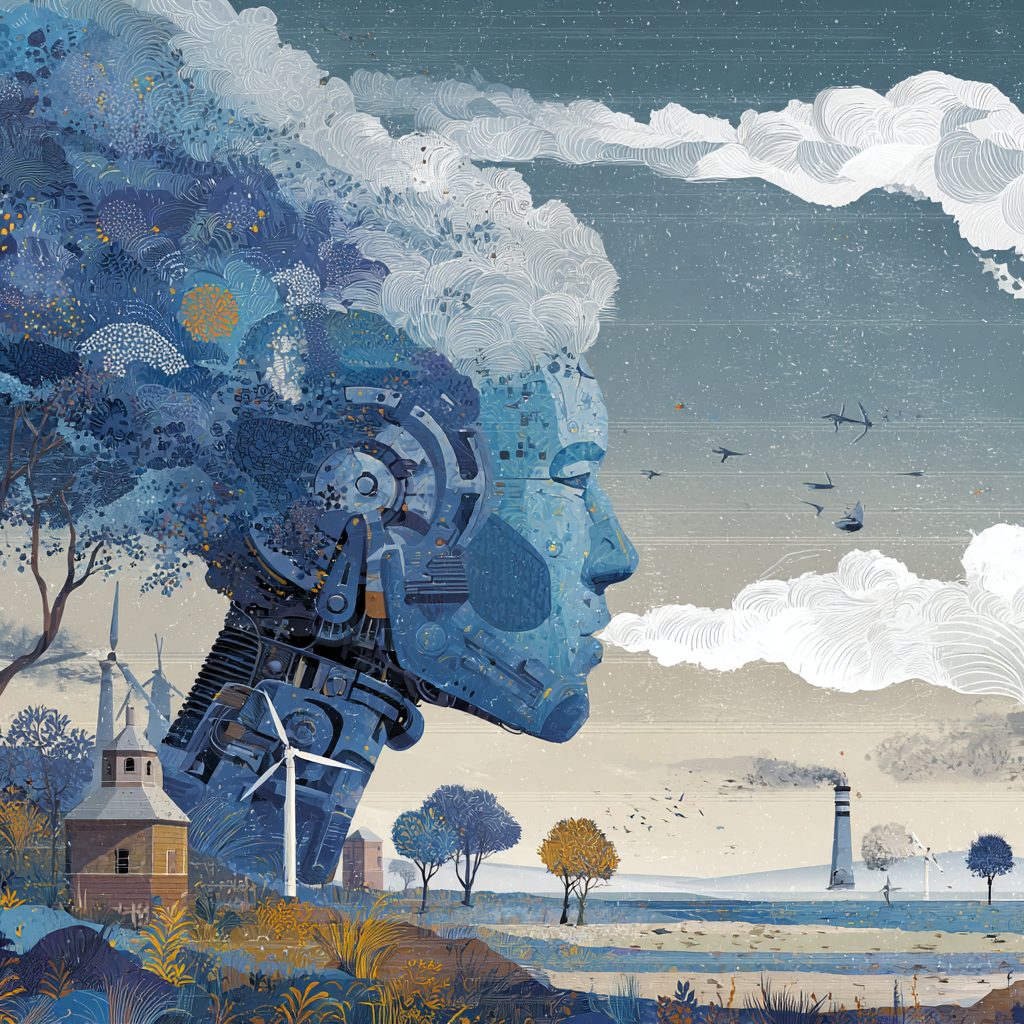Introduction
Le réchauffement climatique est sans doute le plus grand défi de notre siècle. Fonte accélérée des glaces, canicules records, incendies dévastateurs et perte massive de biodiversité rappellent chaque jour l’urgence d’agir. Dans ce contexte, un nouvel acteur attire l’attention : l’intelligence artificielle (IA). Souvent perçue comme énergivore, elle s’impose pourtant comme un levier crucial pour analyser, anticiper et réduire l’impact du changement climatique. L’interaction entre l’intelligence artificielle et le climat est complexe : ses algorithmes peuvent autant consommer des ressources qu’en économiser. Cet article approfondi (2500+ mots) explore son évolution, ses applications concrètes, ses défis éthiques et ses perspectives pour un avenir durable.
Contexte et évolution
Les premiers modèles climatiques datent des années 1950. Limités par la puissance de calcul, ils se basaient uniquement sur des équations physiques. L’IA a bouleversé ce paradigme. Grâce au machine learning et au deep learning, il est désormais possible d’exploiter des pétaoctets de données hétérogènes : satellites, capteurs IoT, relevés socio-économiques, historiques météorologiques.
Selon le GIEC, l’IA a réduit de 30 % l’incertitude de certaines projections climatiques. Des institutions comme MIT Climate, Stanford Earth et l’ONU développent déjà des projets conjoints IA-climat.
« L’intelligence artificielle ne remplace pas la science du climat. Elle l’accélère, la complète et l’amplifie. »
Applications concrètes de l’IA pour le climat
Loin d’être une promesse lointaine, l’IA est déjà à l’œuvre dans de nombreux secteurs. Elle permet de réduire l’impact environnemental tout en améliorant l’efficacité des systèmes.
1. Réseaux énergétiques intelligents
L’intermittence du solaire et de l’éolien constitue un défi. L’IA agit comme un chef d’orchestre, anticipant la demande et ajustant la production. Les algorithmes analysent la météo, les historiques de consommation et les prix pour gérer le stockage et distribuer l’électricité de façon optimale.
Selon l’Agence Internationale de l’Énergie, les smart grids optimisés par IA réduisent de 15 à 20 % les pertes et augmentent de 10 % l’intégration des renouvelables.
2. Modélisation climatique avancée
Les modèles climatiques traditionnels nécessitent des semaines de calcul. Les IA réduisent ce délai à quelques heures. Des chercheurs du Centre européen de prévisions météorologiques exploitent des réseaux neuronaux pour prévoir les événements extrêmes.

3. Agriculture de précision
L’agriculture représente environ 20 % des émissions mondiales (FAO). L’IA optimise l’irrigation, réduit l’usage de pesticides et augmente les rendements. Des drones équipés de capteurs détectent la santé des cultures et l’humidité du sol.

4. Transports et logistique
Le transport génère 24 % des émissions mondiales. L’IA optimise les itinéraires et réduit la consommation. DHL et Maersk utilisent déjà ces outils. Une étude de Nature estime que l’IA pourrait réduire de 10 % les émissions du secteur d’ici 2030.
5. Biodiversité et océans
Les océans absorbent 25 % du CO₂ émis. L’IA surveille la santé des récifs, détecte la surpêche et suit les migrations animales. Ces données alimentent des politiques de conservation ciblées.
6. Capture carbone et matériaux innovants
L’IA accélère la recherche sur des matériaux capables de capturer le CO₂. Des startups comme Climeworks explorent la séquestration directe dans l’air.

Impact économique et social
Selon le Forum économique mondial, le marché de l’IA appliquée au climat pourrait dépasser 50 milliards de dollars d’ici 2030. En parallèle, elle crée des emplois dans les énergies renouvelables, la gestion des données et l’ingénierie verte. Cependant, des inégalités d’accès subsistent entre pays développés et en développement.
Défis et éthique
L’IA consomme aussi : entraîner un grand modèle peut générer autant de CO₂ qu’une centaine de vols transatlantiques. Les solutions passent par des datacenters verts, des GPU sobres et une réglementation internationale.
Les biais de données et la concentration du pouvoir (Google, Microsoft, Amazon) posent également des questions de souveraineté.
Réglementations et politiques publiques
L’Union européenne a intégré des exigences environnementales dans sa loi sur l’IA. Les COP incluent désormais l’IA dans leurs discussions. Les États-Unis et la Chine investissent massivement, mais sans les mêmes garde-fous.
Perspectives 2030–2050
Le GIEC prévoit que l’IA sera essentielle pour : anticiper les migrations climatiques, gérer les ressources en eau et concevoir des villes résilientes. Les jumeaux numériques de la Terre offriront des simulations inédites pour tester les politiques avant application réelle.
Comment s’impliquer ?
- Explorer Climate Change AI.
- Utiliser Google Earth Engine.
- Contribuer à des projets open source sur GitHub.
- Lire nos analyses sur Total-Dépannage.
FAQ
Qu’est-ce que l’IA appliquée au climat ?
C’est l’utilisation d’algorithmes pour modéliser, anticiper et réduire les impacts du changement climatique.
L’IA peut-elle réduire les émissions ?
Oui : smart grids, agriculture de précision, logistique et capture carbone sont des leviers concrets.
Quels sont les risques ?
Une empreinte carbone élevée, des biais dans les données et une concentration du pouvoir.
Quels secteurs profitent le plus ?
L’énergie, l’agriculture, la logistique et la biodiversité.
Où se former ?
Sur Coursera, edX et via Climate Change AI.
L’IA est-elle une solution miracle ?
Non. C’est un outil puissant, mais les décisions humaines et politiques restent déterminantes.
Conclusion
L’interaction entre l’intelligence artificielle et le climat est une opportunité unique. L’IA ne sauvera pas la planète seule, mais bien encadrée, elle peut accélérer la transition, réduire les inégalités et renforcer la résilience mondiale. 🌍
🔗 Découvrez plus d’analyses futuristes sur Pinterest et sur Total-Dépannage.
